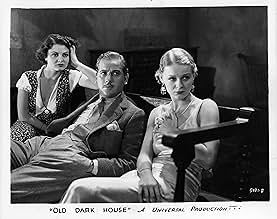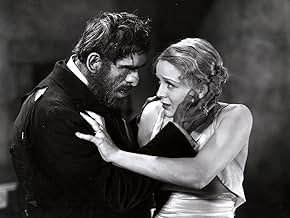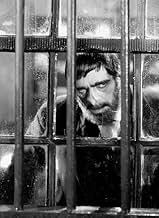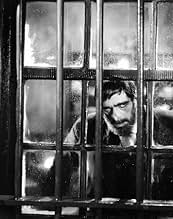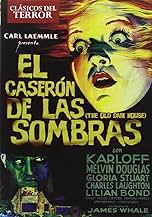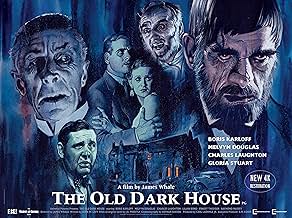VALUTAZIONE IMDb
7,0/10
14.229
LA TUA VALUTAZIONE
Aggiungi una trama nella tua linguaSeeking shelter from a storm, five travelers are in for a bizarre and terrifying night when they stumble upon the Femm family estate.Seeking shelter from a storm, five travelers are in for a bizarre and terrifying night when they stumble upon the Femm family estate.Seeking shelter from a storm, five travelers are in for a bizarre and terrifying night when they stumble upon the Femm family estate.
- Regia
- Sceneggiatura
- Star
- Premi
- 1 candidatura in totale
Recensioni in evidenza
Seeking shelter from a storm, five travelers are in for a bizarre and terrifying night when they stumble upon the Femm family estate.
The film is based on the novel "Benighted" (1927) by J. B. Priestley, who saw the "queer inmates" of the house as symbols of post-war pessimism. He was quite reluctant to sell the rights, thinking his characters would not adapt well to the screen. However, in January 1932, he changed his mind when Universal offered him $12,500 (roughly $215,000 in 2017 money).
The novel was adapted for the screen by R. C. Sheriff ("The Invisible Man") and Benn Levy (Hitchcock's "Blackmail"). Universal Studios producer Carl Laemmle invited Levy from England to Universal City after being impressed with Levy's screenplay for "Waterloo Bridge" (1931), which was also directed by James Whale. Sheriff and Levy were able to have a script fleshed out by March 1932, a mere two months.
James Whale worked with many collaborators from his previous films including Arthur Edeson, who was the cinematographer for "Frankenstein" (1931) and "Waterloo Bridge" (1931) and set designer Charles D. Hall, who also worked on "Frankenstein". Edeson went on to help create the American Society of Cinematographers (ASC) and become its president. Hall kept "Old Dark House" very scaled back; a viewer could easily mistake the film for a stage production. Ultimately, Hall would work on 11 of Whale's 20 films.
For genre fans, the most obvious repeat collaborator is Boris Karloff, who plays the supporting role of a mute butler. Interestingly, though Karloff's best-known role is Frankenstein's Monster (under Whale's direction), and Whale's best-known film (also "Frankenstein") starred Karloff, the two were not necessarily friends. Cordial, yes, but never close, and yet their names are linked for all eternity.
The cast is all-star by anyone's standards. Whale chose newcomer Gloria Stuart for the glamour role, and this lead to her wider success and her helping found the Screen Actors Guild (SAG). She would soon work with Whale again on both "The Kiss Before the Mirror" and "The Invisible Man", both released in 1933. This was Charles Laughton's first Hollywood film, which came shortly after Laughton had worked with Whale on the English stage.
Laughton was married to Elsa Lanchester, who played the title role in Whale's "Bride of Frankenstein" (1935). "Old Dark House" also started Ernest Thesiger's Hollywood career, and he would go on to work on Whale's "Bride" as Dr. Septimus Pretorius, a role that the studio wanted Claude Rains to have. Of course, Thesiger embodies that role and is as memorable as the bride herself. At the time of casting "Old Dark House", Thesiger had already known Whale and was appearing in one of Benn Levy's plays.
According to Stuart, Whale was a very hands-on director, deciding line delivery, walking, costumes and more. She saw him as an "artist" with his background in both acting and set design, and was "fussy" about makeup, jewelry and props. Because of his rapport with Thesiger, Whale allowed for the most deviations from the script (and book) for his old friend.
"The Old Dark House" was largely ignored at the American box office, although it was a huge hit in Whale's native England. Variety and the Hollywood Filmograph gave the film negative reviews, with Variety calling it a "somewhat inane picture". Other reviews were more positive, but on the whole it was not seen as an instant classic, much to the astonishment of modern audiences.
For many years, the original version was considered a lost film and gained a tremendous reputation as one of the pre-eminent Gothic horror films. Whale's fellow director and friend Curtis Harrington ("Night Tide") helped to prevent "The Old Dark House" from becoming a lost film. Harrington met Whale and Whale's partner David Lewis in 1948, at a time when (according to Harrington) "Whale had no critical reputation at all", unlike how film historians view him today.
When Harrington was signed to Universal in 1967 to direct "Games" with James Caan, he repeatedly asked Universal to locate the film negative of "Old Dark House", although it was Harrington himself who discovered a print of the film in the vaults of Universal Studios in 1968. He persuaded James Card the George Eastman House film archive to finance a new duplicate negative of the poorly-kept first reel, and restore the rest of the film. The original nitrate negative had survived, though the first reel only existed as a lavender protection print.
Harrington further was the one responsible for getting the film legally released. Because Universal had not pursued the copyright, the rights to the story reverted to the Priestley estate and were bought up by Columbia, who released an inferior remake by acclaimed director William Castle in 1963. Harrington was able to convince Columbia to allow copies of the Universal film to be made, though it would be years before distribution and re-screenings were legally cleared.
In 2017, the Cohen Film Collection released a brand new Blu-ray featuring a 4K restoration that brings this classic back to life. They also packed the disc with two different commentaries (one with actress Gloria Stuart, the other with James Whale biographer James Curtis). There is a featurette on how Curtis Harrington saved the film from obscurity, and a completely new 15-minute interview with Sara Karloff.
The film is based on the novel "Benighted" (1927) by J. B. Priestley, who saw the "queer inmates" of the house as symbols of post-war pessimism. He was quite reluctant to sell the rights, thinking his characters would not adapt well to the screen. However, in January 1932, he changed his mind when Universal offered him $12,500 (roughly $215,000 in 2017 money).
The novel was adapted for the screen by R. C. Sheriff ("The Invisible Man") and Benn Levy (Hitchcock's "Blackmail"). Universal Studios producer Carl Laemmle invited Levy from England to Universal City after being impressed with Levy's screenplay for "Waterloo Bridge" (1931), which was also directed by James Whale. Sheriff and Levy were able to have a script fleshed out by March 1932, a mere two months.
James Whale worked with many collaborators from his previous films including Arthur Edeson, who was the cinematographer for "Frankenstein" (1931) and "Waterloo Bridge" (1931) and set designer Charles D. Hall, who also worked on "Frankenstein". Edeson went on to help create the American Society of Cinematographers (ASC) and become its president. Hall kept "Old Dark House" very scaled back; a viewer could easily mistake the film for a stage production. Ultimately, Hall would work on 11 of Whale's 20 films.
For genre fans, the most obvious repeat collaborator is Boris Karloff, who plays the supporting role of a mute butler. Interestingly, though Karloff's best-known role is Frankenstein's Monster (under Whale's direction), and Whale's best-known film (also "Frankenstein") starred Karloff, the two were not necessarily friends. Cordial, yes, but never close, and yet their names are linked for all eternity.
The cast is all-star by anyone's standards. Whale chose newcomer Gloria Stuart for the glamour role, and this lead to her wider success and her helping found the Screen Actors Guild (SAG). She would soon work with Whale again on both "The Kiss Before the Mirror" and "The Invisible Man", both released in 1933. This was Charles Laughton's first Hollywood film, which came shortly after Laughton had worked with Whale on the English stage.
Laughton was married to Elsa Lanchester, who played the title role in Whale's "Bride of Frankenstein" (1935). "Old Dark House" also started Ernest Thesiger's Hollywood career, and he would go on to work on Whale's "Bride" as Dr. Septimus Pretorius, a role that the studio wanted Claude Rains to have. Of course, Thesiger embodies that role and is as memorable as the bride herself. At the time of casting "Old Dark House", Thesiger had already known Whale and was appearing in one of Benn Levy's plays.
According to Stuart, Whale was a very hands-on director, deciding line delivery, walking, costumes and more. She saw him as an "artist" with his background in both acting and set design, and was "fussy" about makeup, jewelry and props. Because of his rapport with Thesiger, Whale allowed for the most deviations from the script (and book) for his old friend.
"The Old Dark House" was largely ignored at the American box office, although it was a huge hit in Whale's native England. Variety and the Hollywood Filmograph gave the film negative reviews, with Variety calling it a "somewhat inane picture". Other reviews were more positive, but on the whole it was not seen as an instant classic, much to the astonishment of modern audiences.
For many years, the original version was considered a lost film and gained a tremendous reputation as one of the pre-eminent Gothic horror films. Whale's fellow director and friend Curtis Harrington ("Night Tide") helped to prevent "The Old Dark House" from becoming a lost film. Harrington met Whale and Whale's partner David Lewis in 1948, at a time when (according to Harrington) "Whale had no critical reputation at all", unlike how film historians view him today.
When Harrington was signed to Universal in 1967 to direct "Games" with James Caan, he repeatedly asked Universal to locate the film negative of "Old Dark House", although it was Harrington himself who discovered a print of the film in the vaults of Universal Studios in 1968. He persuaded James Card the George Eastman House film archive to finance a new duplicate negative of the poorly-kept first reel, and restore the rest of the film. The original nitrate negative had survived, though the first reel only existed as a lavender protection print.
Harrington further was the one responsible for getting the film legally released. Because Universal had not pursued the copyright, the rights to the story reverted to the Priestley estate and were bought up by Columbia, who released an inferior remake by acclaimed director William Castle in 1963. Harrington was able to convince Columbia to allow copies of the Universal film to be made, though it would be years before distribution and re-screenings were legally cleared.
In 2017, the Cohen Film Collection released a brand new Blu-ray featuring a 4K restoration that brings this classic back to life. They also packed the disc with two different commentaries (one with actress Gloria Stuart, the other with James Whale biographer James Curtis). There is a featurette on how Curtis Harrington saved the film from obscurity, and a completely new 15-minute interview with Sara Karloff.
Tales about sinister, creepy mansions were already clichéd by the time director James Whale directed THE OLD DARK HOUSE--and instead of presenting the piece as a straight-forward thriller he mixed the film's very atmospheric cinematography with a wild strain of parody. The result is a movie with a bizarre camp humor that foreshadows Whale's slightly later and even more bizarrely camp THE BRIDE OF FRANKESTEIN.
The plot, very based loosely on a J.B. Priestly novel, is perfunctory, existing only to throw together an ensemble cast of already-famous and soon-to-be-famous stars. Five motorists are trapped in the wilds of Wales during a horrific storm and are forced to seek shelter at, of course, an old dark house... but their unwilling hosts are a neurotic Ernest Thesiger, his religious fanatic sister Eva Moore, and their hulking, deformed, and mute butler Boris Karloff. Before the night is over the storm-weary travelers experience everything from a hellish meal to religious lectures--not to mention assault, attempted rape, mysterious cackling, a bit of arson, and a touch of homosexual hysteria (courtesy of Thesiger, Moore, and a surprise male character who is actually played by a woman) thrown in for good measure.
The cast is exceptional; in addition to Karloff, Thesiger, and Moore, we have Melvyn Douglas, Raymond Massey, Charles Laughton, Gloria Stuart, and Lilian Bond, and they wring the most from the covertly wicked script, with Eva Moore ranting about "laughter and sin," Thesiger inviting Raymond Massey into his room "to see a few things," and one of the most socially awkward meals ever put to film. But the film's real power is its cinematography: when they say old DARK house, they really mean it, and the look of the film is just as disorienting for viewers as for the characters; particularly noteworthy is the scene in which Moore lectures Gloria Stuart, with their faces distorted by the bedroom mirror, and the sequence in which Karloff pursues the white-clad and wind-whipped Gloria Stuart with mayhem in mind.
Viewers who expect "Universial Horror" fare will probably be disappointed by THE OLD DARK HOUSE, and director James Whale would create a still more memorable combination of horror and high-camp with THE BRIDE OF FRANKENSTIEN. But THE OLD DARK HOUSE is an overlooked jewel of unusual quality: a sardonic parody of a famous theme, well played, filmed and scripted. Recommended.
Gary F. Taylor, aka GFT, Amazon Reviewer
The plot, very based loosely on a J.B. Priestly novel, is perfunctory, existing only to throw together an ensemble cast of already-famous and soon-to-be-famous stars. Five motorists are trapped in the wilds of Wales during a horrific storm and are forced to seek shelter at, of course, an old dark house... but their unwilling hosts are a neurotic Ernest Thesiger, his religious fanatic sister Eva Moore, and their hulking, deformed, and mute butler Boris Karloff. Before the night is over the storm-weary travelers experience everything from a hellish meal to religious lectures--not to mention assault, attempted rape, mysterious cackling, a bit of arson, and a touch of homosexual hysteria (courtesy of Thesiger, Moore, and a surprise male character who is actually played by a woman) thrown in for good measure.
The cast is exceptional; in addition to Karloff, Thesiger, and Moore, we have Melvyn Douglas, Raymond Massey, Charles Laughton, Gloria Stuart, and Lilian Bond, and they wring the most from the covertly wicked script, with Eva Moore ranting about "laughter and sin," Thesiger inviting Raymond Massey into his room "to see a few things," and one of the most socially awkward meals ever put to film. But the film's real power is its cinematography: when they say old DARK house, they really mean it, and the look of the film is just as disorienting for viewers as for the characters; particularly noteworthy is the scene in which Moore lectures Gloria Stuart, with their faces distorted by the bedroom mirror, and the sequence in which Karloff pursues the white-clad and wind-whipped Gloria Stuart with mayhem in mind.
Viewers who expect "Universial Horror" fare will probably be disappointed by THE OLD DARK HOUSE, and director James Whale would create a still more memorable combination of horror and high-camp with THE BRIDE OF FRANKENSTIEN. But THE OLD DARK HOUSE is an overlooked jewel of unusual quality: a sardonic parody of a famous theme, well played, filmed and scripted. Recommended.
Gary F. Taylor, aka GFT, Amazon Reviewer
While perfectly enjoyable as a camp comedy of manners (that element comes courtesy of director James Whale) and as an elegant, low-key horror, The Old Dark House can best be appreciated when you know a little about JB Priestley, author of the source play Benighted. (Or was it originally a novel? It definitely exists as a stage play, at any rate.)
Priestley was an English playwright, novelist, radio broadcaster and journalist who became very well known in Britain in the 1930s and 1940s for presenting a kindly, commonsensical version of socialism and community spirit to a nation battling through the Great Depression, the Second World War and its aftermath. Several of his plays combine a supernatural or at least mysterious strain with an allegorical message about the importance of unselfishness and people working together to help one another. If you watch The Old Dark House with these points in mind you may see it in a more moving and profound light. Dangerous Corner and An Inspector Calls are similar examples of his work, still popular in Britain with amateur drama groups and touring theatre companies.
If you can, see Old Dark House and Whale's later Bride of Frankenstein as a home video double bill and compare Ernest Thesiger's delightfully feline and remarkably similar performances as Horace Femm and Dr Praetorius. "Have a potato" and "Have some gin" may well become part of your private family language for ever after.
Priestley was an English playwright, novelist, radio broadcaster and journalist who became very well known in Britain in the 1930s and 1940s for presenting a kindly, commonsensical version of socialism and community spirit to a nation battling through the Great Depression, the Second World War and its aftermath. Several of his plays combine a supernatural or at least mysterious strain with an allegorical message about the importance of unselfishness and people working together to help one another. If you watch The Old Dark House with these points in mind you may see it in a more moving and profound light. Dangerous Corner and An Inspector Calls are similar examples of his work, still popular in Britain with amateur drama groups and touring theatre companies.
If you can, see Old Dark House and Whale's later Bride of Frankenstein as a home video double bill and compare Ernest Thesiger's delightfully feline and remarkably similar performances as Horace Femm and Dr Praetorius. "Have a potato" and "Have some gin" may well become part of your private family language for ever after.
Truly one of Universal greatest unsung horror films, The Old Dark House is a unique blend of gothic setting, quirky characterizations, wicked black and dry humour, a great ensemble cast, and the workings of the mind of James Whale. Whale made the film the year after Frankenstein. He was again paired with Karloff. But unlike their first association, Karloff's star is far less brighter in this film as his performance, although good and servicable, is over-shadowed by atmosphere, Whale's direction, witty dialogue, and a cast of scene stealers such as Melvyn Douglas, Charles Laughton, Eva Moore, and Ernest Thesiger. Others in the notable cast include lovely Gloria Stuart, Lillian Bond, and Raymond Massey. Thesiger and Moore, as the brother and sister imposed upon by travellers in the stormy night, are fantastic as they interact and play out their eccentricities to perfection. Thesiger has the choice lines in the film as the effeminate Horace Femm, a cowardly man that cowers to his deaf sister. He is a joy to watch and each of his lines oozes with oil. Moore is also very good as she bellows repeatedly, "N beds! No beds! They can have no beds!" The story is based on a novel by J. B. Priestly. The plot is somewhat antiquated now, but Whale's direction puts a lot of life into it. And let's not forget Karloff, however small his part, still turns in a great menacing performance as a lecherous, drunken servant named Morgan ogling Gloria Stuart from the moment he sees her. The Old Dark House is a great film, and it should be more highly touted by Universal!
It's one of director James Whale's most offbeat films along with "Bride of Frankenstein" (IMHO his masterpiece). It's based on the J.B. Priestley novel and it was filmed during the Pre-Code Era. I'd say it's a mixture of horror film, spoof and black comedy...in some aspects it's related to "Arsenic and Old Lace", although it has a darker mood.
On a very stormy night, a group of travelers find shelter in an eerie and scary welsh manor, inhabited by the "weird" Femm family, and there begins a quick chain of events (the film lasts only 72 minutes) until the film's conclusion. The weary and wet travelers include Raymond Massey and Gloria Stuart as a married couple who are traveling through the country with happy-go-lucky friend Mr. Penderel, played by Melvyn Douglas. Other travelers who arrive to this Huge House, are Charles Laughton, playing a rich businessman of humble origins with his lover, Lillian Bond, who's great and very sexy in her role of a joyous chorus-girl.
Then we have the Femms: Religion fanatic Rebecca Femm, who has an obsession with "sinners", expertly played by sinister-looking Eva Moore; her wishy-washy brother Horace Femm, played by the great Ernest Thesiger, who impersonated "Dr. Pretorius" in "Bride of Frankenstein"; 102 years old Sir Roderick Femm, who is played by actress Elspeth Dudgeon, who's listed in the cast as "John" Dudgeon (creepy character!) and "seemingly harmless" psychopath and pyromaniac Saul Femm, played by Brember Wills.
Boris Karloff deserves to be mentioned apart, who impersonates the scarred butler, Morgan, who lusts after Mrs. Waverton (Gloria Stuart), perhaps because she gets to wear a sexy 1930s low-cut dress, the type which pre-Code Jean Harlow wore.
Whale's direction is excellent. I was especially impressed with the shot of the front of the spooky old house in which the Femms reside as seen from the eyes of the passengers in the car. Whale liked to use a subjective camera, which was unusual for many early thirties movies. The camera is the viewer as that viewer moves through the scenes.
Best of all was the late Gloria Stuart's commentary on the Kino DVD, which was excellent. She is such a pleasure to listen to as she reminisces about the movie, and talks all about everyone involved. I never would've known anything about the brilliant actress Eva Moore if it wasn't for her great commentary. She provides so much insight, and is so funny and charming at the same time. She also talks about other things, and other aspects of her career. It's almost like having a conversation with her, she's that relaxed. She speaks very highly of James Whale, and says that he's the best director she ever worked with. She points out different aspects of his filming, especially his use of shadows. She says that making this movie was the high point of her career, and that she never made another movie that she enjoyed working on as much as this one. Take that James Cameron!
Highly recommended.
On a very stormy night, a group of travelers find shelter in an eerie and scary welsh manor, inhabited by the "weird" Femm family, and there begins a quick chain of events (the film lasts only 72 minutes) until the film's conclusion. The weary and wet travelers include Raymond Massey and Gloria Stuart as a married couple who are traveling through the country with happy-go-lucky friend Mr. Penderel, played by Melvyn Douglas. Other travelers who arrive to this Huge House, are Charles Laughton, playing a rich businessman of humble origins with his lover, Lillian Bond, who's great and very sexy in her role of a joyous chorus-girl.
Then we have the Femms: Religion fanatic Rebecca Femm, who has an obsession with "sinners", expertly played by sinister-looking Eva Moore; her wishy-washy brother Horace Femm, played by the great Ernest Thesiger, who impersonated "Dr. Pretorius" in "Bride of Frankenstein"; 102 years old Sir Roderick Femm, who is played by actress Elspeth Dudgeon, who's listed in the cast as "John" Dudgeon (creepy character!) and "seemingly harmless" psychopath and pyromaniac Saul Femm, played by Brember Wills.
Boris Karloff deserves to be mentioned apart, who impersonates the scarred butler, Morgan, who lusts after Mrs. Waverton (Gloria Stuart), perhaps because she gets to wear a sexy 1930s low-cut dress, the type which pre-Code Jean Harlow wore.
Whale's direction is excellent. I was especially impressed with the shot of the front of the spooky old house in which the Femms reside as seen from the eyes of the passengers in the car. Whale liked to use a subjective camera, which was unusual for many early thirties movies. The camera is the viewer as that viewer moves through the scenes.
Best of all was the late Gloria Stuart's commentary on the Kino DVD, which was excellent. She is such a pleasure to listen to as she reminisces about the movie, and talks all about everyone involved. I never would've known anything about the brilliant actress Eva Moore if it wasn't for her great commentary. She provides so much insight, and is so funny and charming at the same time. She also talks about other things, and other aspects of her career. It's almost like having a conversation with her, she's that relaxed. She speaks very highly of James Whale, and says that he's the best director she ever worked with. She points out different aspects of his filming, especially his use of shadows. She says that making this movie was the high point of her career, and that she never made another movie that she enjoyed working on as much as this one. Take that James Cameron!
Highly recommended.
Lo sapevi?
- QuizThis was Boris Karloff's first credited starring role. His name had been left off the Frankenstein (1931) publicity packages and only credited in the end credits of that film.
- BlooperOne of Gloria Stuart's elaborate earrings is missing about mid-film, it reappears for 2 close up shots and disappears again in medium and long shots.
- Citazioni
Rebecca Femm: [feels the fabric of Margaret Waverton's low-cut gown] Fine stuff, but it'll rot.
Rebecca Femm: [touches Margaret's skin above the neckline] Finer stuff still, but it'll rot too!
- Curiosità sui creditiBefore the Universal Pictures logo: PRODUCER'S NOTE: - Karloff, the mad butler in this production, is the same Karloff who created the part of the mechanical monster in "Frankenstein". We explain this to settle all disputes in advance, even though such disputes are a tribute to his great versatility
- ConnessioniEdited into Pale Moonlight Theater: The Old Dark House (2015)
- Colonne sonoreSingin' in the Rain
(uncredited)
Music by Nacio Herb Brown
Lyrics by Arthur Freed
Sung by Melvyn Douglas a cappella, with modified lyrics
[Penderel sings the song in the car as the he and the Wavertons make their way on the washed out road]
I più visti
Accedi per valutare e creare un elenco di titoli salvati per ottenere consigli personalizzati
Dettagli
- Data di uscita
- Paese di origine
- Lingua
- Celebre anche come
- The Old Dark House
- Luoghi delle riprese
- Azienda produttrice
- Vedi altri crediti dell’azienda su IMDbPro
Botteghino
- Lordo Stati Uniti e Canada
- 25.678 USD
- Lordo in tutto il mondo
- 34.649 USD
- Tempo di esecuzione
- 1h 12min(72 min)
- Colore
- Proporzioni
- 1.37 : 1
Contribuisci a questa pagina
Suggerisci una modifica o aggiungi i contenuti mancanti



